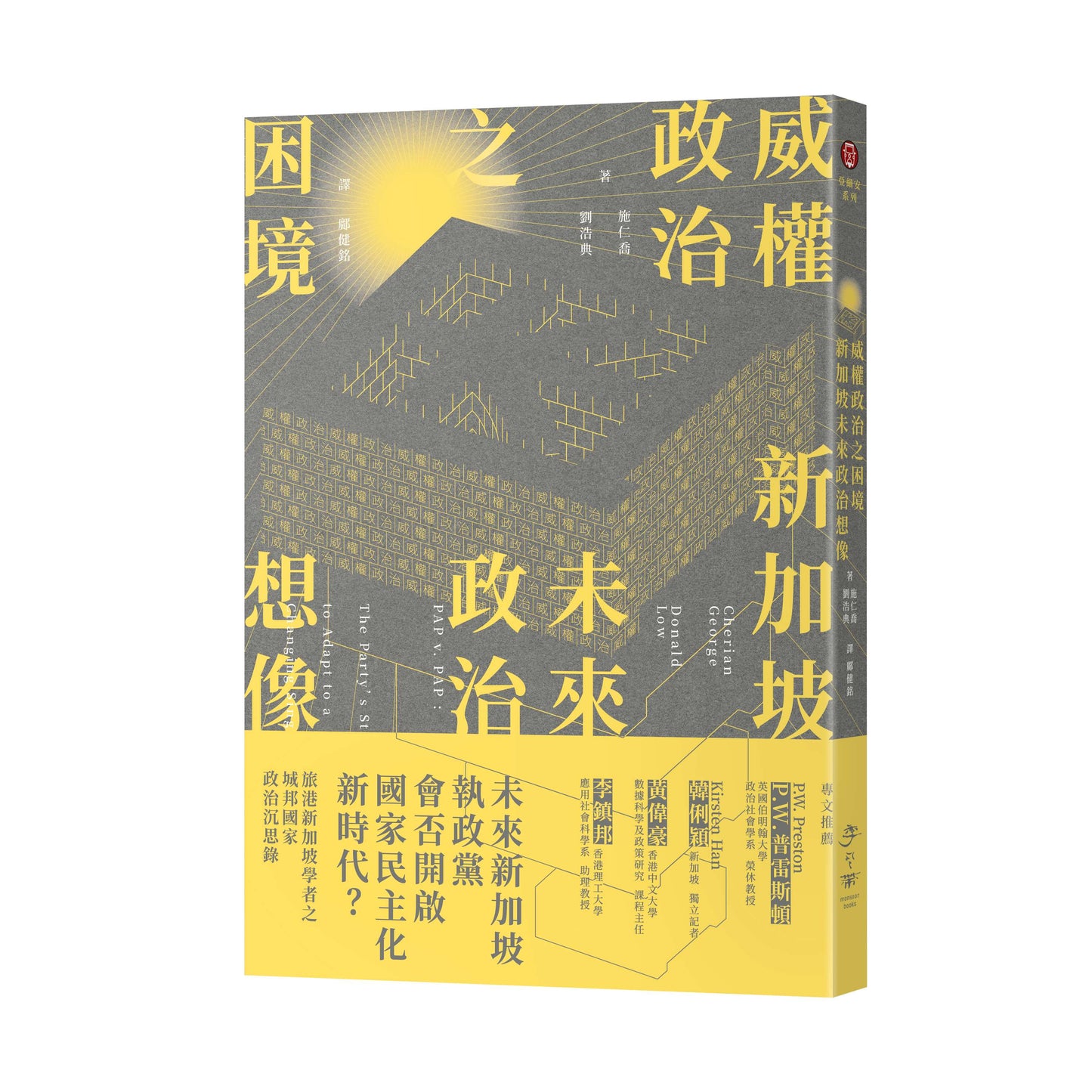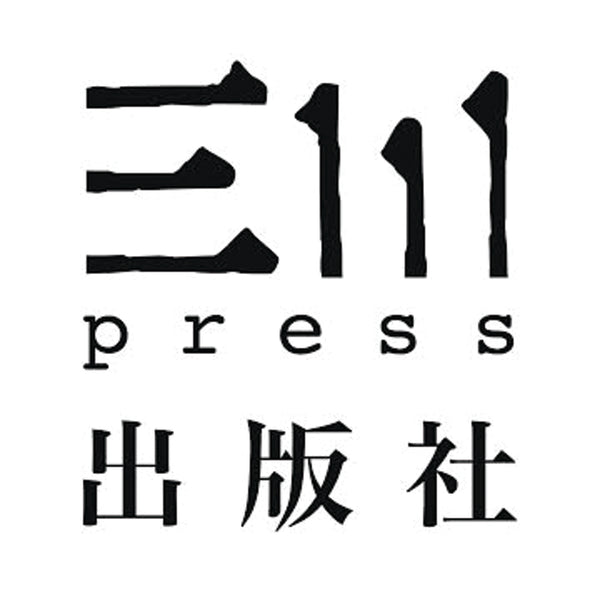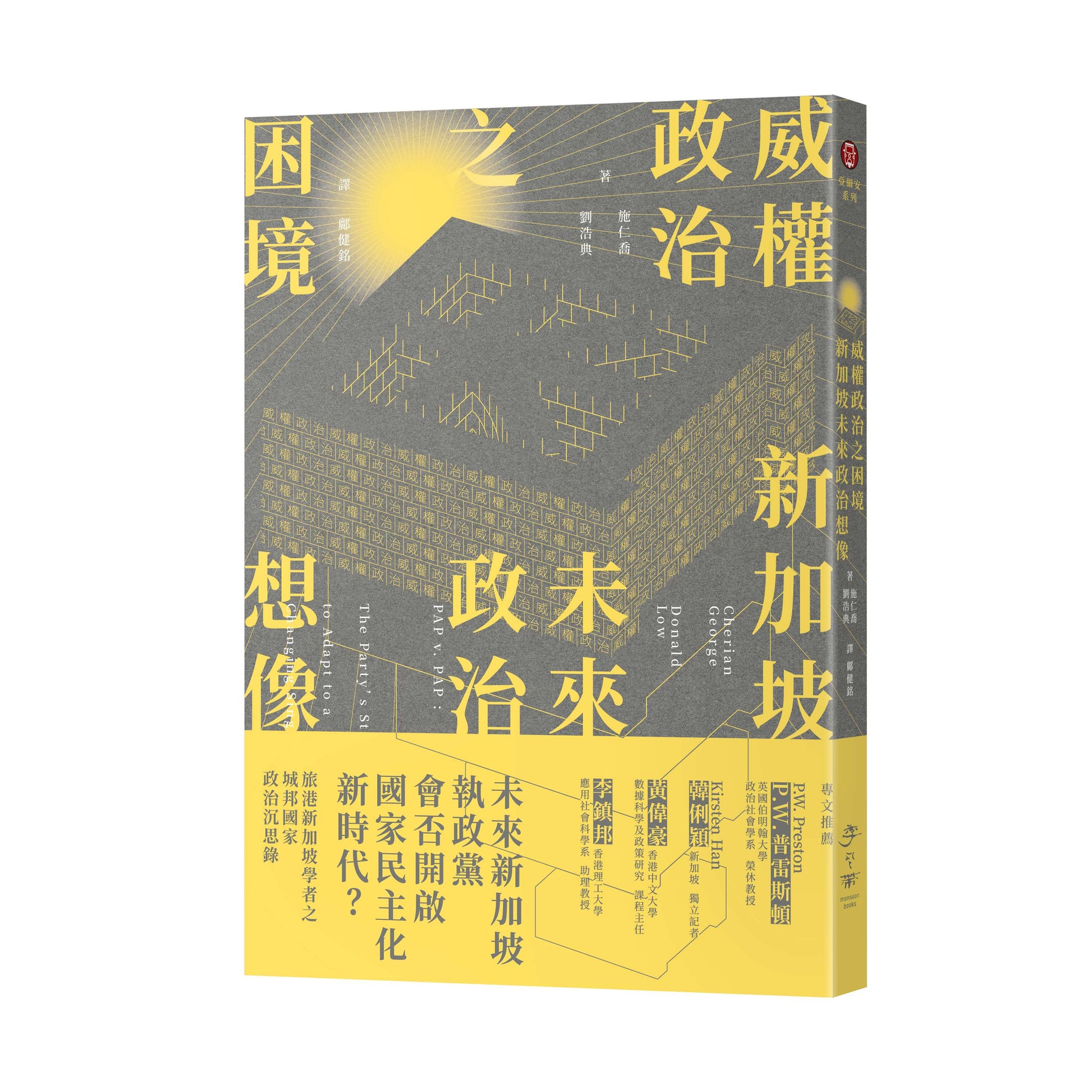The Dilemma of Authoritarian Politics: Imagining Singapore's Future Politics
The Dilemma of Authoritarian Politics: Imagining Singapore's Future Politics
5 in stock
Couldn't load pickup availability
出版社: 季风带
ISBN/EAN: 9789860611144
出版日期: 2021-12-01
页数: 256页
语言: Traditional Chinese
Will Singapore’s ruling party usher in a new era of national democratization in the future?
Reflections on City-State Politics by a Singaporean Scholar in Hong Kong
• What kind of dilemma is Singapore’s authoritarian governance model facing?
• Why does Singapore’s ruling party advocate elitism but use populism to respond to social voices?
• Why does Singapore’s ruling party need to take the initiative to usher in a new era of national democratization?
Singapore's politics in the post-Lee Kuan Yew era have been closely watched. In the 2020 general election, the People's Action Party (PAP) retained power, but its vote share dropped by approximately 10 percentage points, while the opposition's total number of parliamentary seats reached a record high, reaching ten.
While there is no definitive analysis of the future direction of Singaporean politics, a growing consensus among commentators is that Singapore's governance model is undermined and that the People's Action Party government needs to change to cope with the changing national political climate.
Visions of Singapore's future politics can be broadly divided into two categories: the first, centered on the People's Action Party (PAP); the second, centered on Singaporean society. Singaporean scholars Cherian George and Donald Low, the authors of "The Dilemma of Authoritarian Politics: Imaginations of Singapore's Future Politics," advocate the former. They affirm the PAP's past performance and believe that Singapore's future national development can still benefit from its strong governance style. Therefore, in "The Dilemma of Authoritarian Politics: Imaginations of Singapore's Future Politics," they directly point out the various shortcomings of the PAP government's governance style, hoping to awaken its goodwill and help it understand that building a more equal and just society, developing a more democratic and equitable political and economic system, expanding political diversity, and strengthening government accountability are all in the interests of Singapore as a nation and even the ruling party. They believe that if the PAP government can leverage its governance advantages early and promote change from within, this will be the best scenario for both the ruling party and the country's future.
Within Singapore, the views expressed in "The Dilemma of Authoritarian Politics: Singapore's Future Political Imagination" may not necessarily be universally applauded, but in the Chinese-speaking world, it is an important reference text based on Singapore's local context for understanding the characteristics and changes in Singapore's political ecology.
Recommended articles
P.W. Preston ( Emeritus Professor of Political Sociology at the University of Birmingham, UK, and co-author of Singapore after Lee Kuan Yew )
Kirsten Han ( Singapore-based independent journalist)
Wong Wai-ho (Director of the Data Science and Policy Studies Programme at the Chinese University of Hong Kong)
Li Zhenbang (Assistant Professor, Department of Applied Social Sciences, Hong Kong Polytechnic University)
Cherian George
A Singaporean, he is a former reporter for The Straits Times. Before moving to Hong Kong, he was a scholar at Nanyang Technological University in Singapore. He is currently the Associate Dean (Research and Development) at the School of Communication at Hong Kong Baptist University. His recent publications include Hate Spin: The Manufacture of Religious Offense and Its Threat to Democracy.
Donald Low
A Singaporean, he was Vice Dean of the Lee Kuan Yew School of Public Policy in Singapore before moving to Hong Kong. He is currently a Senior Lecturer and Professor of Practice in the Division of Public Policy Studies and Director of the Institute for Emerging Markets at the Hong Kong University of Science and Technology.
Kwong Kin Ming
Editor-in-Chief of Monsoon Culture, Taiwan. He studied at the Lee Kuan Yew School of Public Policy in Singapore and conducted research there. He is the author of The British Era: The Art of British Colonial Governance and Two Cities Confronted: The Singapore Model and Hong Kong's Future. He has co-authored books including China's Influence and the Center-Periphery: Tug of War in Hong Kong, Taiwan, and the Indo-Pacific (forthcoming), East Asia: Developments and Challenges, Hong Kong Under Chinese Rule: Economic Integration and Political Gridlock, and The Social Movement Era: The Trajectory of Hong Kong's Contentious Politics. His articles have appeared in The Diplomat and Asian Survey ; Hong Kong's Sing Tao Daily, Ming Pao, Economic Daily, Asia Weekly, Stand News, Initium Media, and Taiwan Review; Singapore's Channel NewsAsia and Lianhe Zaobao; Malaysia's Contemporary Review and Suihuo Review; Taiwan's Up News, New News, Wind Media, Key Review Network, and Story; and China's Candidate Project.
Foreword (I) The Past and Present of the Post-Lee Kuan Yew Era / P.W. Preston 3
Foreword (II) A Pre-announced Warning: On the Quiet Transformation of Singapore’s Political Ecology / Han Liying 11
Foreword (Part 3) Singapore and the People’s Action Party: The Critical Point of Reform / Huang Weihao 17
Foreword (IV) Looking Ahead to Singapore Politics in the Post-Lee Kuan Yew Era / Lee Chin Pong 21
Introduction: Another Imagination of the Relationship between State and Society
——Reading "The Dilemma of Authoritarian Politics: Singapore's Future Political Imagination" by Kuang Jianming 29
New Preface to the Traditional Chinese Edition <br>Three Preconditions for Writing "The Dilemma of Authoritarian Politics: Imagining Singapore's Future Politics" by Shi Renqiao and Liu Haodian37
Preface to the English Edition <br>Freedom and Realpolitik: A Map of the Development of the Singapore Model in the Post-Lee Kuan Yew Era / Shi Renqiao and Liu Haodian 45
Introduction: Singapore in Transformation and the People's Action Party's Response 57
PAP self-reform? 58
The legitimacy of the PAP government60
Singapore Change 60
Singapore's Future Governance Issues62
The People's Action Party and the New Ideology 67
Book Structure 69
Part 1: 2020 General Election, Global Pandemic, and Singapore's Challenges
Chapter 1: Singapore’s Hidden Concerns 73
Regarding the 2020 General Election Results74
People's Action Party's election performance75
The future of governance for the People's Action Party government78
Chapter 2 The 2020 Election and Generational Conflict 81
Sengkang Constituency Effect 83
Singapore Government's Empty Promises for Reform85
The Rise of Civil Society88
Chapter 3 Singapore's Development and Democracy 91
Three Forms of Political System93
Modernization Theory in Singapore 94
The Sustainability of Authoritarianism and the Rise of Nationalism96
The Evolution of Authoritarianism in Singapore100
Chapter 4 The Necessity of Reform 103
Social Resentment and the Singapore Government’s Response104
The People’s Action Party’s Groupthink 106
The People's Action Party and the Democratic Reform Process108
Chapter 5: Revelation of Crisis 113
Singapore Government’s Response to the Epidemic114
Lessons from the Epidemic: Diversity and the Necessity of Humanity 117
Part II: Economic Development and Social Justice
Chapter 6 Beyond Efficiency: On National Resilience and Social Justice 123
Post-epidemic economic crisis124
Efficiency and Its Limitations 125
On the Necessity of Social Resilience 126
Social Justice and Equality 130
Chapter 7 Reflections on the Situation of Foreign Workers and National Productivity in Singapore 133
Singapore’s Productivity Shortfalls134
Singapore's Industrial Policy 136
Chapter 8: Singapore’s New Fiscal Compact 139
Regarding the increase in sales tax
The Necessity of Abandoning Economic Dogma 141
Economic Policy Imaginations Beyond Sales Tax Increases 143
Chapter 9 on Property Tax 147
The Impact of Neoliberalism 147
Regarding the levy of asset tax 149
Chapter 10: Embarrassing Ethnic Issues in Singapore 153
Singapore's General Election and Ethnic Issues 154
On Singapore’s Multiculturalism Policy155
The Need to Abandon Lee Kuan Yew's Era Dogma157
Part III National Democracy and Government Accountability in Singapore
Chapter 11: Singapore’s Democratic Future 171
Opposition forces in Singapore172
Asymmetric Expectations of Voters from Singapore’s Ruling Party173
Supermajority in Congress176
On Democracy 181
Chapter 12: The Need for an Ombudsman in Singapore 183
Talking about Singapore's presidential election184
Singapore's governance ranking is 186th
The need for an Ombudsman
Chapter 13: Rebuilding Singapore’s Media Ecosystem 191
Singapore's Media Management Model192
Another Media Management Imagination195
The Road to Reforming Media Management Model199
Chapter 14: Social Passion under the Singapore Model 205
Passion Made Possible: The Ideal and Reality of Advertising Slogans 206
Punished Singaporean Social Passion 206
Three Communication Models on Governance 207
Singapore’s governance communication model 209
Chapter 15: Free Thought in Singapore's New Political Normal 215
Singapore’s New Political Normal 216
Singapore's political and economic reforms should be implemented
Singapore's Vision of a Just City 219
Is the People's Action Party ideologically rigid?
Chapter 16: The Necessity of Singapore as an Open City 227
Control and Freedom in Singapore 228
Elections and the People's Action Party in a Democratic System 229
Freedom of Speech in Singapore232
Chapter 17 Populism and the People's Action Party 237
On Populism in Singapore 239
Elite and the Masses 241
The Temptation of Populist Nationalism 244
Chapter 18: Singapore’s “Cancel Culture” 251
Singapore’s “Boycott Culture” 253
Spreaders of “Boycott Culture”254
Share


